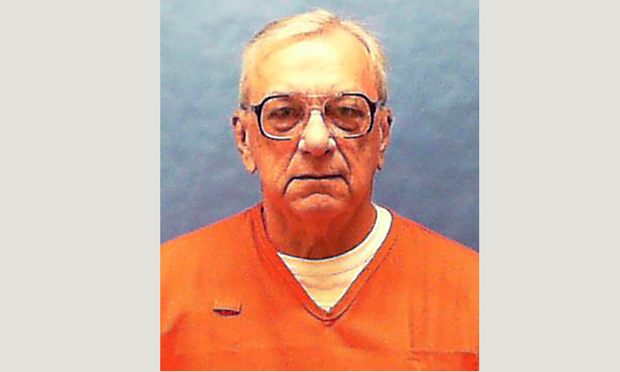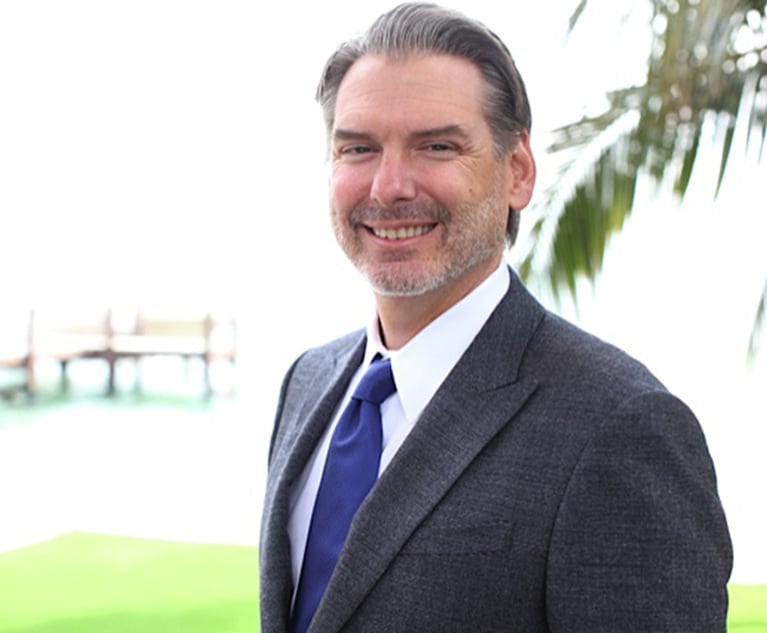Federal Judge Puts Execution of Dailey on Hold in Pinellas Murder
James Dailey was sent to death row for the May 1985 murder of 14-year-old Shelly Boggio, whose nude body was found with multiple stab wounds in Pinellas County.
October 25, 2019 at 01:55 PM
4 minute read
 Florida death row inmate James Dailey/courtesy photo
Florida death row inmate James Dailey/courtesy photo
Little more than two weeks before death row inmate James Dailey was scheduled to be executed, a federal judge issued a stay that will keep Dailey alive until at least the end of December.
U.S. District Judge William Jung imposed the stay through Dec. 30 because new attorneys were appointed to represent Dailey on Oct. 1. Jung wrote that the attorneys in the Capital Habeas Unit of the Office of the Federal Public Defender for the Middle District of Florida needed more time to review and make filings in the case.
Gov. Ron DeSantis last month signed a death warrant for Dailey and scheduled the execution for Nov. 7. Dailey was sent to death row in the May 1985 murder of 14-year-old Shelly Boggio, whose nude body was found with multiple stab wounds in Pinellas County.
In the five-page order Wednesday, Jung said the stay would allow time for the new attorneys to file a habeas corpus petition, a legal procedure that generally challenges the constitutionality of a prisoner being incarcerated. Dailey's supporters have scurried in recent weeks to prevent his execution by arguing that he did not commit the murder.
"While this court takes no position on any potential habeas application that Dailey's new counsel might file between now and the due date … — or even if such application would be reviewable on its merits without approval from the Eleventh Circuit Court of Appeals — it is in the interests of a just and fair system for Mr. Dailey's new counsel to have the statutory grant of time to review and present habeas issues to this court," Jung wrote. "Mr. Dailey has been on Death Row since 1987. Staying his execution for 53 days to ensure that Dailey's right to counsel is meaningful is scant prejudice to respondents [the state]."
Dailey, now 73, and another man, Jack Pearcy, were convicted in the murder of Boggio, who had been hitchhiking before her death. Pearcy, now 64, was sentenced to life in prison, while Dailey was sentenced to death.
Along with Jung issuing the stay, Dailey's supporters have made a series of filings at the Florida Supreme Court to try to block the execution. The supporters, including attorneys with the Innocence Project of Florida, argue that Pearcy has confessed to the murder and cleared Dailey of killing Boggio.
DeSantis this week disputed that such arguments should prevent the execution of Dailey.
"The injustice that I see in this case is that he [Pearcy] didn't get the death penalty," DeSantis said. "I mean, he got life in prison. He should have had the death. … This was one of the most gruesome crimes in the history of Pinellas County. You have the family. It was just terrible. So I think the record, to me, is satisfactory. We're willing to listen to things, but this has been litigated over and over and over. So at some point, you need to do justice."
But Seth Miller, executive director of the Innocence Project of Florida, said in an interview with The News Service of Florida that evidence undercuts key pieces of the state's case and points to Dailey's innocence. He said, for example, that Dailey's death sentence was based, in part, on testimony from jailhouse snitches, who were "incentivized" to pin the crime on Dailey.
"The system is not designed to overturn a wrongful conviction. It's designed to preserve a conviction at all costs," Miller said. "How can you go forward to execute someone when the key pieces of evidence used to convict them have been so thoroughly discredited?"
Jung's order granting the stay said he appointed the Capital Habeas Unit of the Office of the Federal Public Defender to represent Dailey after previous attorneys sought to withdraw because of an alleged conflict of interest. The order did not detail that conflict.
The state objected to granting a stay, Jung wrote.
Jim Saunders and Dara Kam report for the News Service of Florida.
This content has been archived. It is available through our partners, LexisNexis® and Bloomberg Law.
To view this content, please continue to their sites.
Not a Lexis Subscriber?
Subscribe Now
Not a Bloomberg Law Subscriber?
Subscribe Now
NOT FOR REPRINT
© 2025 ALM Global, LLC, All Rights Reserved. Request academic re-use from www.copyright.com. All other uses, submit a request to [email protected]. For more information visit Asset & Logo Licensing.
You Might Like
View All
Meta agrees to pay $25 million to settle lawsuit from Trump after Jan. 6 suspension
4 minute read
Executive Assistant, Alleging Pregnancy Discrimination and Retaliation, Sues Florida Healthcare Entrepreneur
3 minute read
Trending Stories
- 1Coerced Confessions and the Burden of Proof Beyond Reasonable Doubt
- 2Attorneys ‘On the Move’: O’Melveny Hires Former NBA Vice President; MoFo Adds Venture Capital Partner
- 3'Skin in the Game': Lawyers Call for Pressure After American Airlines Crash
- 4Apple Files Appeal to DC Circuit Aiming to Intervene in Google Search Monopoly Case
- 5A Plan Is Brewing to Limit Big-Dollar Suits in Georgia—and Lawyers Have Mixed Feelings
Who Got The Work
J. Brugh Lower of Gibbons has entered an appearance for industrial equipment supplier Devco Corporation in a pending trademark infringement lawsuit. The suit, accusing the defendant of selling knock-off Graco products, was filed Dec. 18 in New Jersey District Court by Rivkin Radler on behalf of Graco Inc. and Graco Minnesota. The case, assigned to U.S. District Judge Zahid N. Quraishi, is 3:24-cv-11294, Graco Inc. et al v. Devco Corporation.
Who Got The Work
Rebecca Maller-Stein and Kent A. Yalowitz of Arnold & Porter Kaye Scholer have entered their appearances for Hanaco Venture Capital and its executives, Lior Prosor and David Frankel, in a pending securities lawsuit. The action, filed on Dec. 24 in New York Southern District Court by Zell, Aron & Co. on behalf of Goldeneye Advisors, accuses the defendants of negligently and fraudulently managing the plaintiff's $1 million investment. The case, assigned to U.S. District Judge Vernon S. Broderick, is 1:24-cv-09918, Goldeneye Advisors, LLC v. Hanaco Venture Capital, Ltd. et al.
Who Got The Work
Attorneys from A&O Shearman has stepped in as defense counsel for Toronto-Dominion Bank and other defendants in a pending securities class action. The suit, filed Dec. 11 in New York Southern District Court by Bleichmar Fonti & Auld, accuses the defendants of concealing the bank's 'pervasive' deficiencies in regards to its compliance with the Bank Secrecy Act and the quality of its anti-money laundering controls. The case, assigned to U.S. District Judge Arun Subramanian, is 1:24-cv-09445, Gonzalez v. The Toronto-Dominion Bank et al.
Who Got The Work
Crown Castle International, a Pennsylvania company providing shared communications infrastructure, has turned to Luke D. Wolf of Gordon Rees Scully Mansukhani to fend off a pending breach-of-contract lawsuit. The court action, filed Nov. 25 in Michigan Eastern District Court by Hooper Hathaway PC on behalf of The Town Residences LLC, accuses Crown Castle of failing to transfer approximately $30,000 in utility payments from T-Mobile in breach of a roof-top lease and assignment agreement. The case, assigned to U.S. District Judge Susan K. Declercq, is 2:24-cv-13131, The Town Residences LLC v. T-Mobile US, Inc. et al.
Who Got The Work
Wilfred P. Coronato and Daniel M. Schwartz of McCarter & English have stepped in as defense counsel to Electrolux Home Products Inc. in a pending product liability lawsuit. The court action, filed Nov. 26 in New York Eastern District Court by Poulos Lopiccolo PC and Nagel Rice LLP on behalf of David Stern, alleges that the defendant's refrigerators’ drawers and shelving repeatedly break and fall apart within months after purchase. The case, assigned to U.S. District Judge Joan M. Azrack, is 2:24-cv-08204, Stern v. Electrolux Home Products, Inc.
Featured Firms
Law Offices of Gary Martin Hays & Associates, P.C.
(470) 294-1674
Law Offices of Mark E. Salomone
(857) 444-6468
Smith & Hassler
(713) 739-1250







